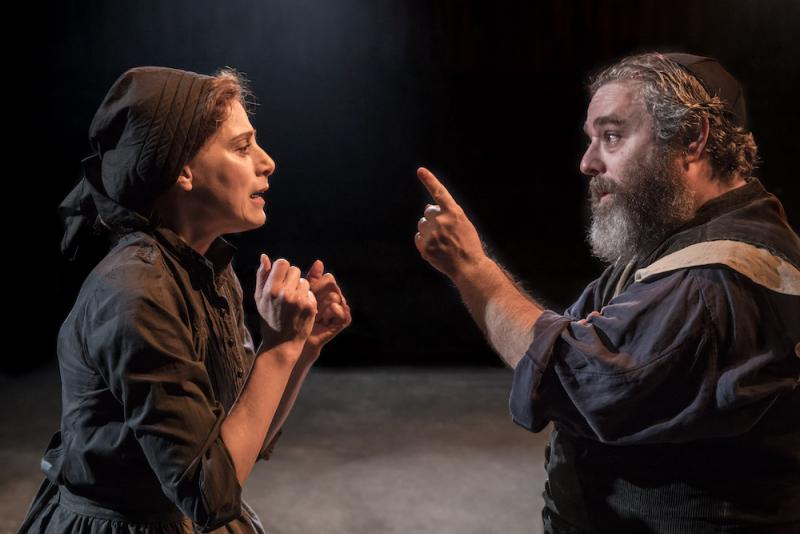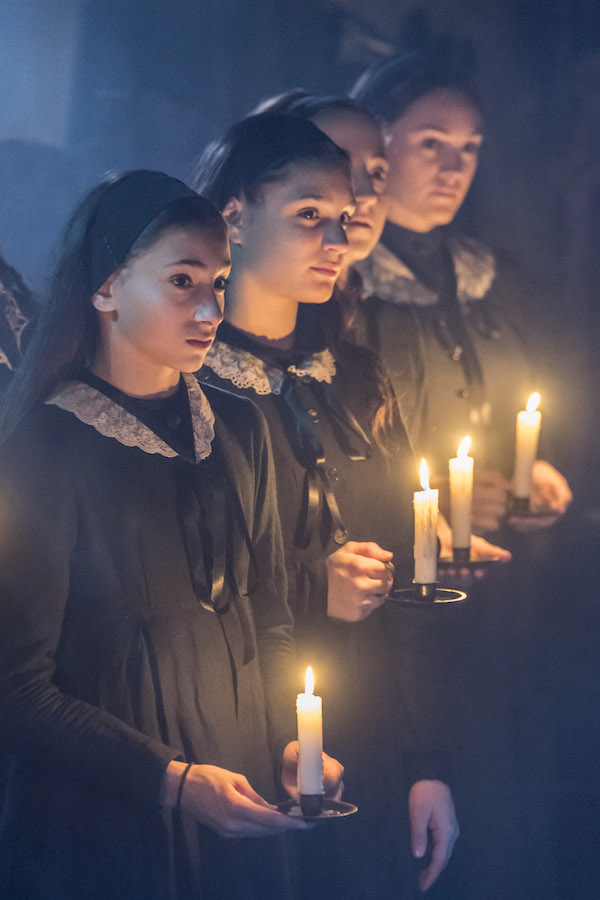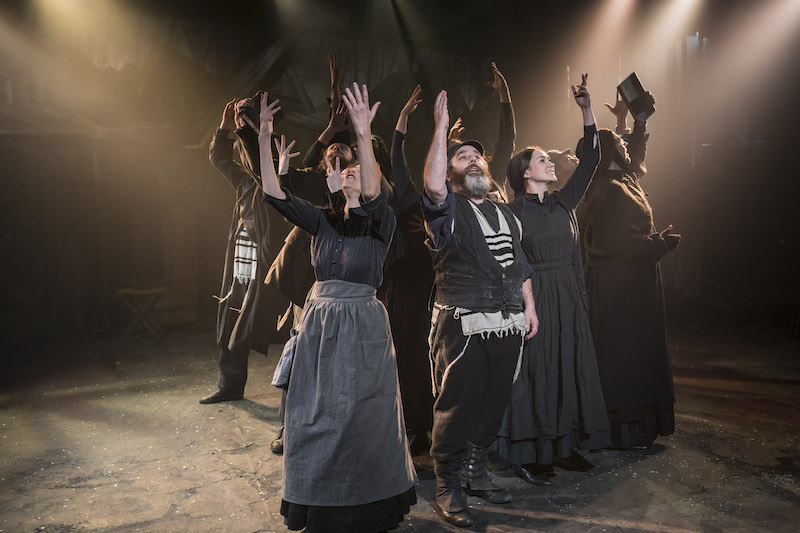Fiddler on the Roof, Menier Chocolate Factory review - family matters in this sensitive musical revival | reviews, news & interviews
Fiddler on the Roof, Menier Chocolate Factory review - family matters in this sensitive musical revival
Fiddler on the Roof, Menier Chocolate Factory review - family matters in this sensitive musical revival
Trevor Nunn's intimate staging provides a soulful seasonal outing

There’s a welcome alternative to panto hijinks in this gem of a Trevor Nunn musical revival – more attuned to the biting hardships of winter, and to the elegiac aspect of change, than to festive jollies.
Joseph Stein, Jerry Bock and Sheldon Harnick drew on Sholem Aleichem’s stories for their 1964 musical, and it initially feels like a folk tale: that of Tevye the dairyman (Andy Nyman) and his travails in the small shtetl of Anatevka in 1905, from having to pull his wagon when his horse goes lame to sparring with wife Golde (Judy Kuhn) and fretting about marrying off his five daughters (pictured below right). But the work opens up in fascinating ways as the village and its Jewish inhabitants come under threat from Russia’s Christian Tsar.
 Nunn plunges the audience into Anatevka in his thrust staging, with cast members weaving through the audience and musicians (an outstanding eight-piece orchestra) joining the action. Robert Jones backs the performers with a cluster of dark wooden houses and trees, plus a pump that gushes out water and props like easily constructed tables and benches. Tim Lutkin’s lighting is hugely effective, both marking the passage of time and adding to evocative moments – such as a candlelit ceremony blessed with a soft golden hue.
Nunn plunges the audience into Anatevka in his thrust staging, with cast members weaving through the audience and musicians (an outstanding eight-piece orchestra) joining the action. Robert Jones backs the performers with a cluster of dark wooden houses and trees, plus a pump that gushes out water and props like easily constructed tables and benches. Tim Lutkin’s lighting is hugely effective, both marking the passage of time and adding to evocative moments – such as a candlelit ceremony blessed with a soft golden hue.
It’s part of a clever balancing act (the show’s overriding theme) that Nunn maintains: we’re simultaneously charmed by this world, and ready to mourn the loss of such communities, while also understanding its limitations. That charm sours somewhat if you’re a teenage girl who the village matchmaker wants to pair with a middle-aged man, or if you fall in love outside of the matchmaker’s arranged marriage sphere – or, even worse, outside of your village and faith. Plus, the traditions that Tevye reveres are already under threat; his world is almost a mirage.
Nyman is superb as the outwardly assured patriarch who actually spends most of the time imploring an uncommunicative God, and whose authority crumbles in the face of his daughters’ entreaties. He has immaculate comic timing, introducing winces and groans from wagon-pulling into “If I Were a Rich Man”, and showing how his faith is both sincere and a handy dodge: paraphrasing the Bible to suit his purposes, or “praying” to avoid confrontation with Golde.
But he’s also genuinely devastating in the more sombre scenes, gripped by a real crisis as he argues back and forth over challenging his long-held beliefs, agonised by the possibility of losing his daughters, and sweetly boyish as the new rash of marrying for love prompts him to seek assurance from his wife. Kuhn, in turn, is an impeccable Golde: obviously the family’s real authority, though shrewd enough to underplay it, and generally counteracting her husband’s passion with wry practicality – yet she, too, is felled by fierce affection for their offspring. Both are in wonderful voice, as are their engaging daughters: Molly Osborne’s quietly determined Tzeitel; Harriet Bunton’s spirited, witty Hodel; and Kirsty MacLaren’s endearingly eager, curious Chava. There are also good turns from Stewart Clarke, showing how Perchik’s worldview becomes shaped by love as well as by radicalism, Joshua Gannon’s stuttering suitor Motel, Louise Gold’s busybody matchmaker, Matt Corner’s charismatic Fyedka, and Fenton Gray’s evasive rabbi. The only issue throughout the cast is inconsistency with accents.
Both are in wonderful voice, as are their engaging daughters: Molly Osborne’s quietly determined Tzeitel; Harriet Bunton’s spirited, witty Hodel; and Kirsty MacLaren’s endearingly eager, curious Chava. There are also good turns from Stewart Clarke, showing how Perchik’s worldview becomes shaped by love as well as by radicalism, Joshua Gannon’s stuttering suitor Motel, Louise Gold’s busybody matchmaker, Matt Corner’s charismatic Fyedka, and Fenton Gray’s evasive rabbi. The only issue throughout the cast is inconsistency with accents.
Threats from the outside world come with a visceral shock: a moment of pure aggression between two literally clashing cultures in the bar, the invasive violence at the wedding, or, perhaps most chillingly, two Russian soldiers physically harassing Chava with casual menace. The stark final moments are a clear contrast from a stage bustling with people exchanging gossip, unified in prayer, or filling every inch of space with euphoric dancing (Matt Cole building on Jerome Robbins’ bravura choreography, above).
Instead, under a fall of snow, we have suitcase-laden figures scattering into the dark – images that merge so easily with contemporary ones of persecuted immigrants seeking a new life, hoping that love makes a home rather than land. But Nunn doesn’t push the political, instead magnifying the personal: parents watching in awe as their child gets married, a proud man realising his rules must bend for family, or travellers hoping their leap of faith will be met with kindness. There may not be tinsel, dames or nutcrackers, but this is definitely a show with heartfelt messages for the festive season.
- Fiddler on the Roof at Menier Chocolate Factory until 9 March, 2019
- Read more theatre reviews on theartsdesk
rating
Explore topics
Share this article
The future of Arts Journalism
You can stop theartsdesk.com closing!
We urgently need financing to survive. Our fundraising drive has thus far raised £49,000 but we need to reach £100,000 or we will be forced to close. Please contribute here: https://gofund.me/c3f6033d
And if you can forward this information to anyone who might assist, we’d be grateful.

Subscribe to theartsdesk.com
Thank you for continuing to read our work on theartsdesk.com. For unlimited access to every article in its entirety, including our archive of more than 15,000 pieces, we're asking for £5 per month or £40 per year. We feel it's a very good deal, and hope you do too.
To take a subscription now simply click here.
And if you're looking for that extra gift for a friend or family member, why not treat them to a theartsdesk.com gift subscription?
more Theatre
 Hamlet, National Theatre review - turning tragedy to comedy is no joke
Hiran Abeyeskera’s childlike prince falls flat in a mixed production
Hamlet, National Theatre review - turning tragedy to comedy is no joke
Hiran Abeyeskera’s childlike prince falls flat in a mixed production
 Rohtko, Barbican review - postmodern meditation on fake and authentic art is less than the sum of its parts
Łukasz Twarkowski's production dazzles without illuminating
Rohtko, Barbican review - postmodern meditation on fake and authentic art is less than the sum of its parts
Łukasz Twarkowski's production dazzles without illuminating
 Lee, Park Theatre review - Lee Krasner looks back on her life as an artist
Informative and interesting, the play's format limits its potential
Lee, Park Theatre review - Lee Krasner looks back on her life as an artist
Informative and interesting, the play's format limits its potential
 Measure for Measure, RSC, Stratford review - 'problem play' has no problem with relevance
Shakespeare, in this adaptation, is at his most perceptive
Measure for Measure, RSC, Stratford review - 'problem play' has no problem with relevance
Shakespeare, in this adaptation, is at his most perceptive
 The Importance of Being Earnest, Noël Coward Theatre review - dazzling and delightful queer fest
West End transfer of National Theatre hit stars Stephen Fry and Olly Alexander
The Importance of Being Earnest, Noël Coward Theatre review - dazzling and delightful queer fest
West End transfer of National Theatre hit stars Stephen Fry and Olly Alexander
 Get Down Tonight, Charing Cross Theatre review - glitz and hits from the 70s
If you love the songs of KC and the Sunshine Band, Please Do Go!
Get Down Tonight, Charing Cross Theatre review - glitz and hits from the 70s
If you love the songs of KC and the Sunshine Band, Please Do Go!
 Punch, Apollo Theatre review - powerful play about the strength of redemption
James Graham's play transfixes the audience at every stage
Punch, Apollo Theatre review - powerful play about the strength of redemption
James Graham's play transfixes the audience at every stage
 The Billionaire Inside Your Head, Hampstead Theatre review - a map of a man with OCD
Will Lord's promising debut burdens a fine cast with too much dialogue
The Billionaire Inside Your Head, Hampstead Theatre review - a map of a man with OCD
Will Lord's promising debut burdens a fine cast with too much dialogue
 50 First Dates: The Musical, The Other Palace review - romcom turned musical
Date movie about repeating dates inspires date musical
50 First Dates: The Musical, The Other Palace review - romcom turned musical
Date movie about repeating dates inspires date musical
 Bacchae, National Theatre review - cheeky, uneven version of Euripides' tragedy
Indhu Rubasingham's tenure gets off to a bold, comic start
Bacchae, National Theatre review - cheeky, uneven version of Euripides' tragedy
Indhu Rubasingham's tenure gets off to a bold, comic start

Add comment